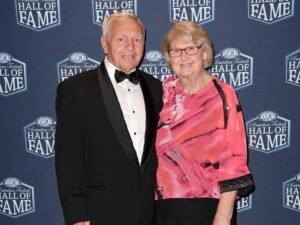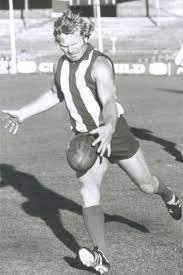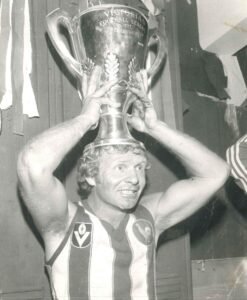Barry Cable MBE is a former Australian rules footballer and coach. Regarded as one of the greatest passers in the history of the sport, he featured in 379 premierships in the Western Australian Football League and the Victorian Football League, later coaching in both competitions.
Bio/Wiki
Age-79yers
Height- 1.68 m
Weight-70 kg
Full Name-Barry Thomas Cable
Born- 22 September 1943
Birthplace- Narrogin, Australia
Profession-Footballer Coach
Spouse-Helen Cable.
Nationality- Australian
Original team(s)-Narrogin Imperials (UGSFL)
Family
The youngest of eleven children, Cable was born in Narrogin, a rural town in the Wheatbelt region of Western Australia. His English-born father, Edward, died when Cable was six, and he was raised by his Aboriginal mother, Dorothy, a member of the Noongar people of southwestern Australia.

Wife
Barry Cable, married to Helen Cable. In 1968, when AFL legend Barry Cable left his laboring wife Helen at the unit, he was instructed to go play football.

Children
Cable had two sons, Barry Jr and Shane Cable, both of whom played for Perth and Subiaco in the WAFL. Shane also played one game for the West Coast Eagles in 1989.
Education
At the age of 11 his headmaster reprimanded him for spending too much time playing. Cable made his debut at the age of 15 with local club Narrogin Imperials in the Upper Great Southern Football League (UGSFL). After spending two years as an apprentice butcher, Cable moved to Perth to try and play in the Western Australian Football League (WAFL).
Career
Playing Career
Rejected by West Australian football power East Fremantle as “too small” – his playing height was said to be 168 cm, or five and a half feet – Cable signed with Perth in 1962.
He began his career as a wingman, but in late 1963 he was promoted to the familiar position of rover. In 1964, Cable won the first of three full Sandover Medals there in 1964, the WAFL’s highest individual honor.
Cable was awarded the Tassie Medal as the best player in the 1966 Australian Football Carnival and was selected in the All-Australian team. That year he played in the first of three consecutive premierships with Perth, winning the Simpson Medal as the best player in all three finals, as well as a second Sandover Medal in 1968.
Coaching Career
Cable was considerably less successful in the VFL as a non-playing coach than as a player, although he led North Melbourne to finals in two of his three full seasons in charge as senior coach in the early 1980s.
In 1983, he coached the team to minor head coaches, but North Melbourne lost both of their final games to an early exit. After falling to second place in 1984 and narrowly avoiding the wooden spoon in percentages, Cable announced his resignation as head coach of Melbourne, stating that his long-term future was in Western Australia.
From 1987 to 1989, Cable was an assistant coach at the AFL club West Coast Eagles.

Career Highlights
Club
- 2x VFL Premiership Player: (1975, 1977)
- 4 x WANFL Premiership Player: (1966, 1967, 1968, 1978)
- 3x Sandover Medal: (1964, 1968, 1973)
- Syd Barker Medal: (1970)
- 7x Perth Best and Fairest: 1965-1969, 1971, 1973
- 3x Simpson Medal: 1966-1968
- Perth captain: 1972-1973
- North Melbourne Team of the Century (Rover)
Representative
- Tassie Medal: 1966
- 2x Australian national team: (1966, 1969)
- 2x Simpson Medal: (1969, 1977)
In General
- Sports Australia Hall of Fame
- Australian Football Hall of Fame, elected 1996, legend status 2012
- Western Australian Football Hall of Fame – Legendary Status
- Indigenous team of the century (rover and coach)
Coaching
- National Football Carnival Championship: 1979
- All Australian team: 1979
- WAFL Premiership: 1978
Achievement/Awards
- Cable won the Sandover Medal as the competition’s fairest and best player in 1964.
- Cable was awarded the Tassie Medal as the best player at the 1966 Australian Football Carnival and was selected in the All-Australian team.
- In 1966, he won the Simpson Medal as the best player in each year’s grand final and another Sandover Medal in 1968.
- In 1969 season to play in the VFL for North Melbourne Football Club and won the club’s best and fairest award in 1972 and 1973, winning his third Sandover Medal in the latter year.
- Cable returned to North Melbourne for the 1974 season, Cable retired. After playing late in the 1979 season when he was injured in a farming accident.
- Cable holds “Legend” status in both the Australian Football Hall of Fame and the Western Australian Football Hall of Fame, as well as membership in the Sport Australia Hall of Fame.
- His seven best and fairest awards for Perth are a club record, while his career total of 379 premiership appearances is the record for any Western Australian-born elite footballer in 2022 and was also an Australian rules football record.
- Kevin Bartlett retired in round 20 of the 1982 VFL season.

Sexual Abusing Allegations
A woman claimed that when she was 17 years old, sexual contact continued and that Cable molested her until she was 30 years old.
She sued the bankrupt former football player for about $1 million, and today District Judge Mark Herron ruled that Cable sexually abused the woman as a child.
The trial heard evidence from four other women who claimed Cable abused them when they were children. Judge Herron said the abuse occurred after Cable engaged in behavior when he first met the claimant in the late 1960s, including sexualized conversations.
Cable, who turns 80 in September, has always denied all allegations and has never been charged.
The woman’s claim was discussed in the civil court for several days last February.
In a statement read outside court by her attorney, Michael Magazanik, he said today’s decision “removes a huge obstacle in my path to recovery.”
Net Worth 2023
Barry Cable’s net worth or net income is estimated to be $1 million – $10 million dollars.
Latest News About Barry Cable
Barry Cable Ordered To Pay Damage In Civil Sexual Abuse Case
Football “legend” Barry Cable was convicted by a Perth judge of sexually abusing a young girl and awarded $818,700 in “catastrophic” damages decades later.
Main points:
- A civil court judge found that Barry Cable abused the girl.
- The cable was ordered to pay him $818,700.
- According to her prosecutor, the sexual abuse began when she was 12 years old.
- The woman, now in her 60s, filed a civil lawsuit in 2019 alleging that Cable began abusing her in the late 1960s when she was 12 years old. Gender dispute.
Lawyer Michael Magazanik was captured by a harsh image during a speech. Attorney Michael Magazanik says his client never gave up on his offer to expose Cable. “The last 50-plus years have taken their toll because so much was taken from me as a child,” he said in a statement.
“Like many survivors of abuse, it took me decades to go to the police and … the system failed me.”
Magazanik called for Cable to be removed from the AFL Hall of Fame and stripped of all honors, including his MBE.
A man stands in front of a blue and white flag at a business event.
Cable has been inducted as a “legend” into both the Australian Football League and WA Football League Halls of Fame. Magazanik said bringing Cable to court was a “very long road” for him.
“She is very relieved to win and is grateful that the court listened to her, and the witnesses and that Barry Cable was exposed as a pederast,” Magazanik said.
He said she gave a very detailed statement to police in 1998 and while officers found there was sufficient evidence against Cable, the DPP found “the likelihood of conviction was insufficient”.
The woman’s trial followed changes to WA law that allowed people who claimed they had been sexually abused to sue.
In civil cases, the standard of proof is “the balance of probabilities,” while in all criminal cases, accusations are proven to a higher standard of “beyond a reasonable doubt.” Magazanik said his client got through the “adversity” even as Cable spent “hundreds of thousands of dollars to get his claim out” when it later went to court.
“All of this was painful for my client, but he never gave up,” Magazanik said.

Identity Exposed
The trial began when Judge Herron lifted extensive non-disclosure orders on Cable’s identity that were in place when he filed suit in March 2019.
He ordered that the restraining order against the woman’s identity remain in place.
Cable was not represented by a lawyer at the trial and did not participate in the trial, relying in his defense on materials he had already submitted to the court.
In emails to the court, his son asked to represent his father, but the judge ruled that this would only be possible if Cable was in court with him.
The trial included evidence from four other women who also claimed Cable abused them when they were young girls – three of whom came forward only after hearing details of the trial.
They all admitted that they didn’t report the incident to the police because Cable was famous, and they didn’t think anyone would believe them. A “behavior model” was created.
The Barry Cable trial has similarities in the alleged offense.
A damages trial into the sexual assault of former AFL footballer Barry Cable has ended with a judge’s verdict.
Judge Herron accepted the evidence of four other women who testified at trial that Cable also sexually abused them.
“I am satisfied that the facts or circumstances described by the four witnesses regarding the sexual abuse of the child establish conduct by the defendant,” he said.
However, he said he was not convinced that evidence of abuse in the 1980s and 1990s made it more likely that he had a sexual interest in the children when he abused her in the 60s and 70s. .
Therefore, the judge said that he could only use the evidence to a limited extent.